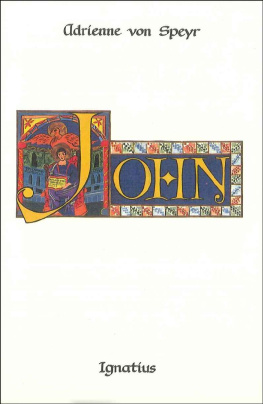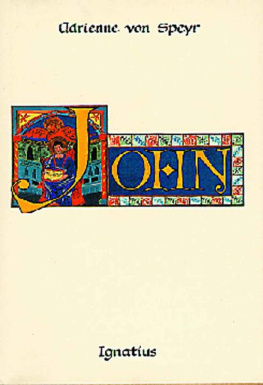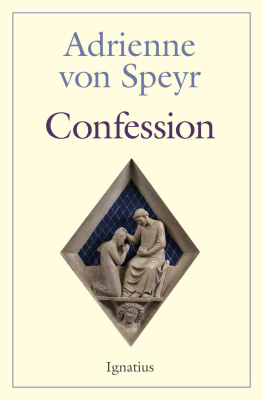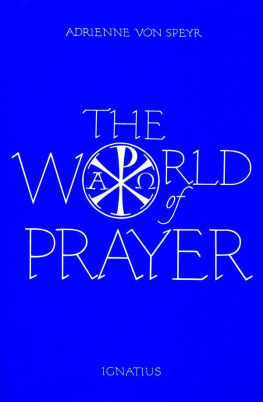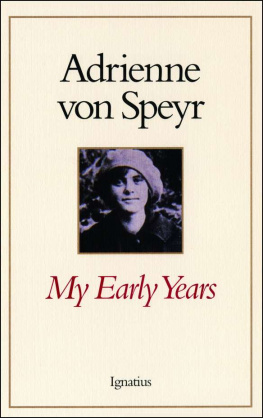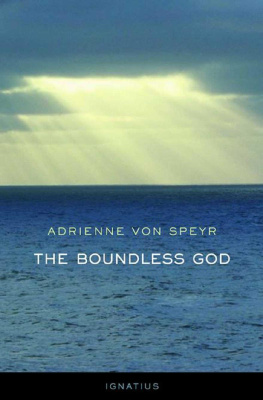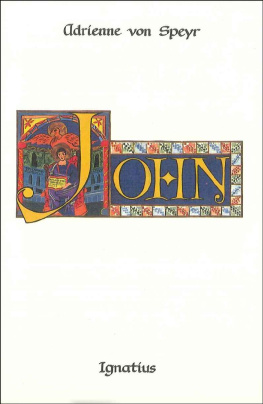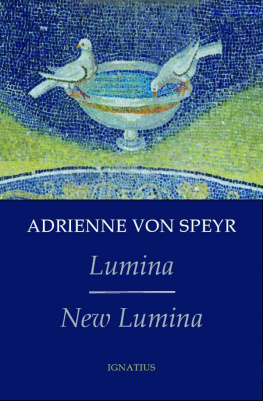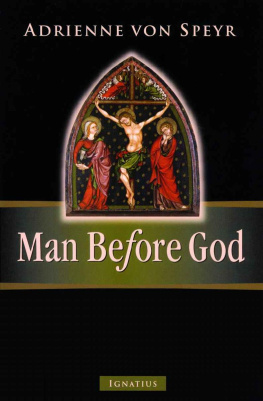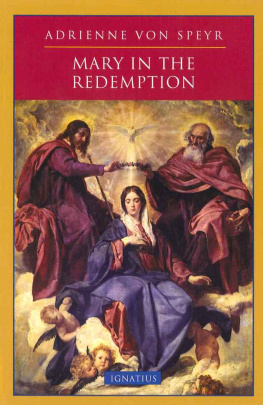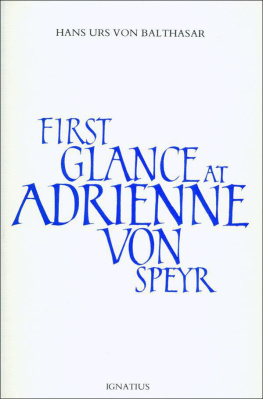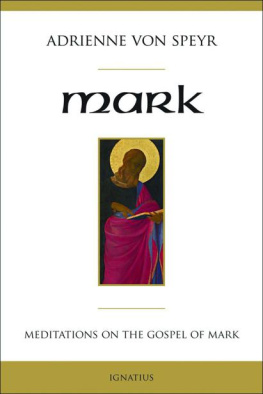Adrienne Von Speyr - The Farewell Discourses: Meditations on John 13-17
Here you can read online Adrienne Von Speyr - The Farewell Discourses: Meditations on John 13-17 full text of the book (entire story) in english for free. Download pdf and epub, get meaning, cover and reviews about this ebook. year: 1987, publisher: Ignatius Press, genre: Children. Description of the work, (preface) as well as reviews are available. Best literature library LitArk.com created for fans of good reading and offers a wide selection of genres:
Romance novel
Science fiction
Adventure
Detective
Science
History
Home and family
Prose
Art
Politics
Computer
Non-fiction
Religion
Business
Children
Humor
Choose a favorite category and find really read worthwhile books. Enjoy immersion in the world of imagination, feel the emotions of the characters or learn something new for yourself, make an fascinating discovery.
- Book:The Farewell Discourses: Meditations on John 13-17
- Author:
- Publisher:Ignatius Press
- Genre:
- Year:1987
- Rating:4 / 5
- Favourites:Add to favourites
- Your mark:
- 80
- 1
- 2
- 3
- 4
- 5
The Farewell Discourses: Meditations on John 13-17: summary, description and annotation
We offer to read an annotation, description, summary or preface (depends on what the author of the book "The Farewell Discourses: Meditations on John 13-17" wrote himself). If you haven't found the necessary information about the book — write in the comments, we will try to find it.
Adrienne Von Speyr: author's other books
Who wrote The Farewell Discourses: Meditations on John 13-17? Find out the surname, the name of the author of the book and a list of all author's works by series.
The Farewell Discourses: Meditations on John 13-17 — read online for free the complete book (whole text) full work
Below is the text of the book, divided by pages. System saving the place of the last page read, allows you to conveniently read the book "The Farewell Discourses: Meditations on John 13-17" online for free, without having to search again every time where you left off. Put a bookmark, and you can go to the page where you finished reading at any time.
Font size:
Interval:
Bookmark:
THE FAREWELL DISCOURSES
ADRIENNE VON SPEYR
TRANSLATED BY E. A. NELSON
IGNATIUS PRESS SAN FRANCISCO
Title of the German original:
Die Abschiedsreden
Betrachtungen ber Johannes 13-17
1948 Johannes Verlag, Einsiedeln
Cover by Victoria Hoke Lane
1987 Ignatius Press, San Francisco
All rights reserved
ISBN 978-0-89870-111-1
Library of Congress Catalogue Number 86-80790
Printed in the United States of America
The truth of revelation can be expressed in many ways. There is the more abstract, conceptual language of scientific theology, which has created a certain web of concepts for the mysteries of Trinity, Incarnation, grace, Church and sacramentsconcepts that aim above all at the clarity and correctness of human thought and have therefore become the indispensable basis for all study of Holy Scripture and Tradition, for all proclamation and preaching. But this does not mean that this scientific language of the theologians is necessarily the most fruitful one for prayerful contemplation of the divine mysteries. The abstractions, for example, that theologians differentiate in the mystery of the Trinitybeing, Person, relation, property, opposition, appropriation, notion, mission, circumincessionall this, both with regard to the laity and in itself, may not be the most direct way to make clear to the Christian the life of love between the Father and the Son in the Holy Spirit. These concepts are by all means correctly formed, and also indispensable in guarding against false interpretations, and yet they are not the direct language of Christ when he speaks of the Father and the Holy Spirit. For the simple, prayerful contemplation of the Christian who is untrained in theology, a simpler mode of expression that stays nearer the language of Christ is to be recommended. True, this language can be in danger of speaking often all too naively and all too humanly about divine things, but if it is led and informed by the proper Christian love and the mind of the Church, it can afford a glimpse into the mysteries of God to many who would otherwise have been deprived of it.
Perhaps this book of meditation on the Farewell Discourses could also be accused here and there of a mode of expression concerning God and the relations between the Divine Persons that comes all too close to human modes of imagining. But let us not forget that all the words of the Lord, indeed all of Holy Scripture, speak to us humans anthropomorphically, that is, in human form. If we were to separate God from all imaginings and words related to creaturely limitation, with its living development and growth, transformation and decay, we would be left with a rigid, dead image of God. In the end we could say almost nothing about God except what he is not. But that is not the meaning or the tone of the new revelation from the Bather. The Son wants only to afford us a concept of what the Father iswhat he is for him, the Son, and what he is for us. He wants to bring the Father humanly closer to us, even at the risk of our making ourselves a human image of God. Christs love for the Father, which he gives to us in grace, will be powerful enoughespecially if we devote and consecrate ourselves to this love with all our heart and soulto carry us again and again over and beyond our limited imaginings into the openness and infinity of the ever-greater God. Any comparisons or images that lead us closer to God, that give us a more living, more correct, warmer idea of infinite love, have fulfilled their purpose. In this sense the meditations in this book should be read and understood: as an exercise in understanding Gods love.
Hans Urs von Balthasar
The Lord has come to the end of his earthly work: he has preached, worked miracles, instituted sacraments and sketched the outlines of the Church. His lifes work appears to lack only the crown: the Passion, through which he will breathe soul into the images he has formed: redemption from sin, the Holy Spirit, interior understanding of all the divine mysteries and the divine power of growth. But between his nearly completed earthly life and work and his future work within the Church and souls, he sees a chasm so great that it threatens to rend his work of redemption in two. His visible work seems to him all too earthly, too much bound to human concepts and imaginings to be able to offer enough starting points to those who are later to receive the divine Spirit, so that they can understand the inner mysteries of God. And his future work in the grace of the sacraments seems to him so hidden, so supernatural, that he is afraid of being too remote from mankinds daily life to make himself understood by them. The chasm that separates the two parts of his mission is in the Passion: the ever-deepening separation from the Father, up to complete forsakenness on the Cross. The further the Lord penetrates into the world of the approaching Passion, and the more the darkness of the coming separation engulfs him, the more unavoidable, immense and final does the night that receives him appear to him. Viewed from this night, his human nature also begins to see his past work in its limitations: how little he has achieved! How weak is the understanding of the Fathers world that he has been able to awaken in a few souls! How meager was the harvest of his life, how ineffectual in comparison to what he had intended before his incarnation: to bring the whole world redeemed back to the Father! How little he can entrust to these few men he will leave alone in a few hours to endure the night of the Cross, in the confusion of their stranded understanding, in the collapse of their plans and dreams, in the bankruptcy of their lifes hopes! He himself wants to taste, in his humanity, this anxiety about his work; he wants to measure this work with his own human powers and not make the task lighter by using his divinity, the whole sweep of his omniscience or the power of his omnipotence. He wants to feel the whole burden of redemption and of the Church on his human shoulders. And out of this sentiment he wants to fill to the brim the last moments that remain to him in the circle of those who are his own. He wants to do everything humanly possible to round off his work, yes, and more: he wants to attempt to shape this conclusion in such a way that at the same time it will form a bridge over the chasm of separation of the Passion. He wants to demonstrate clearly and indisputablynot to himself but to the Father and the disciplesthe unity between his visible and invisible works. In this his last hour, he wants to let his whole earthly work, which even before was concerned with nothing other than the heavenly Kingdom and the Father, open up in a last explosion into the dimensions of the beyond; to surpass his own human words and deeds once more in such a way that the divine becomes as though immediately transparent in them. On the other hand, he wants to clarify, as if in anticipation, the future invisible reality of his remaining and working in the Church, in these words and deeds of transitionactions that are of such divine evidence that all future divine life in the Church will simply appear to be a development of them.
Thus he fills his farewell hour with something twofold, with a concluding deed and a concluding word; both are the crowning of his earthly work and the anticipation of his future, hidden existence. Both, in transition, already breathe the Spirit of the transfigured Lord in the Eucharist. The deed itself is, again, a double onefoot-washing and mealwhereby the foot-washing is related to the meal as confession is to Eucharist, on the one hand, and as the visible symbol is to the invisible, true content, on the other. And both are possible only through anticipation of the Passion, of whose course and fruits the Lord disposes in advance. The place to which he goes for the foot-washing is the place of suffering, the deed he accomplishes is the forgiveness of sin, and the gifts of flesh and blood that are given and poured out expressly refer to his coming bloody sacrifice on the Cross.
Next pageFont size:
Interval:
Bookmark:
Similar books «The Farewell Discourses: Meditations on John 13-17»
Look at similar books to The Farewell Discourses: Meditations on John 13-17. We have selected literature similar in name and meaning in the hope of providing readers with more options to find new, interesting, not yet read works.
Discussion, reviews of the book The Farewell Discourses: Meditations on John 13-17 and just readers' own opinions. Leave your comments, write what you think about the work, its meaning or the main characters. Specify what exactly you liked and what you didn't like, and why you think so.

